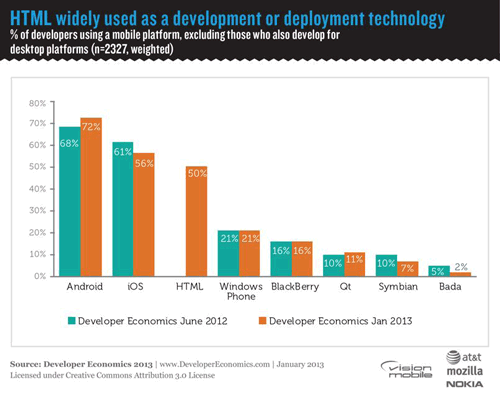News
Mobile Developer Survey: Opportunities for Windows Phone, BlackBerry
- By Keith Ward
- February 14, 2013
A recent survey of developers shows that, although Android and iOS continue to rule the mobile market, there are still opportunities for other platforms to get in the game and muscle their way into the big leagues.
That's according to VisionMobile's "Developer Economics 2013" study. VisionMobile is a London-based ecosystem analyst firm, and has been producing the report for a number of years. Its latest survey of 3,460 developers across 95 countries found that 47 percent of mobile developers plan on building apps for Windows Phone, and 15 percent intend to build for the just-released BlackBerry 10 platform.
Those numbers still fall far short of the 72 percent "mindshare" held by Android -- a 4 percent increase from 2012 -- and the 56 percent mindshare for iOS (mindshare is the percentage of developers using a given platform). It's worth noting that iOS' mindshare dropped 5 points from the previous year; VisionMobile believes it's due to "the influx of Asian developers showing a clear preference towards Android," it states in the report.
The third most popular mobile platform among developers is HTML, which 50 percent of respondents use. The report surmises that HTML shouldn't be seen as a primary competitor with the other platforms; rather, it's viewed more as a technology than a software creation and delivery platform.
 |
This chart shows the relative mindshare for the major mobile platforms from VisionMobile's 2013 Developer Economics survey. |
On the Windows mobile front, which includes both Windows Phone and Windows 8, while developers still see much promise in the platforms, there remains a "wait and see" attitude regarding sales; in fact, the 47 percent number is identical to the previous year, indicating that enthusiasm hasn't necessarily increased with the release of both OSes.
Another finding of the survey is that developers who target two mobile platforms tend to make more money. Seventy-eight percent develop for two or more platforms concurrently, and to no one's surprise, the top two are Android and iOS. Developers who skip those two suffer for it economically: they "generate, on average, half the revenue of those developers that do, leaving little doubt as to the concentration of power within these two major ecosystems," the report states.
Going beyond the smartphone segment, VisionMobile's survey found that tablets are the up-and-comers, but more of a threat to the PC market than other mobile devices. Although the iPad maintains a healthy lead, the report points out Apple's response to cheaper challengers like Google's Nexus 7 tablet -- the iPad Mini -- shows that Cupertino knows it's vulnerable in the tablet space. VisionMobile expects tablet sales to equal PC sales in the next year or two.
Comparing Android and iPhone head-to-head shows that long-time trends are continuing for developers: that iOS apps take in more money, while Android has an easier learning curve and lower cost of app development. That may explain why iOS is still the primary platform (42 percent) that mobile developers work on, with Android trailing by a good bit, at 31 percent. For that, among other reasons, the report concludes that "it is fair to say that iOS comes out as the winner in developer perceptions."
About the Author
Keith Ward is the editor in chief of Virtualization & Cloud Review. Follow him on Twitter @VirtReviewKeith.